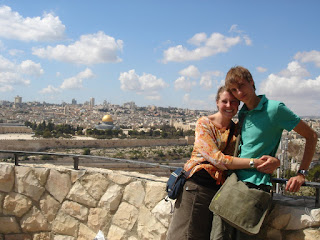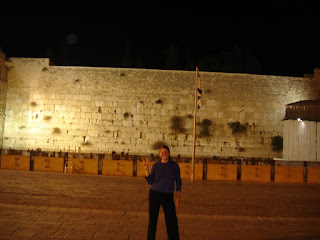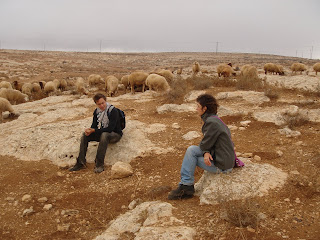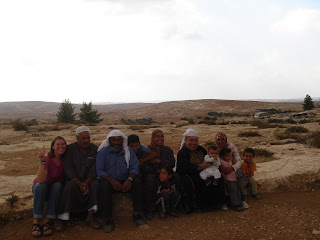My apologies that this blog update has been so long in the making; internet connection is spotty at best lately and it takes me many sessions at the computer to complete a full report. And once I finish, I still feel like there is so much more I should say.
I hope you enjoy reading it and learning more about what's really happening on the ground in the Middle East, specifically in Palestine, although it's certainly not an exhaustive portrayal of all that's going on. For a good overview of Palestine's recent history in brief, check out: http://atouristsguidetotheoccupation.blogspot.com/2009/04/tourists-guide-to-occupation.html. Overall, I had an extremely intense month in Israel, Palestine, Jordan and the United Arab Emirates, and hope one day to return to this fascinating region to do more social justice and solidarity work, Inshallah (Arabic for "if God wills it").
Before you begin to view my photos and read the captions that never seem to truly encapsulate what I photographed, I want to say that I entered this part of the world with a particularly open mind and open heart. While I came here to work alongside Palestinians, my aim has never been to generalize Israelis, and especially not Jews as a whole, as a malicious people with occupation at their sole intent. My experience confirmed for me that the Israeli state can never fully represent the diversity and will of its people, just like every other country and governmental foreign policy in the world (the US certainly included, a point I have always had to make clear while traveling as an American!). There have been many amazing Israelis and Jews from around the world that I have met along the way, all of them doing important work to end the occupation and urge for a more peaceful solution to the daily struggles of the Palestinians (and to some degree, the Israelis).
Noteworthy Israeli Peace Organizations:
B'Tselem (http://www.btselem.org/English/index.asp)
Anarchists Against the Wall (http://www.awalls.org/)
Rabbis for Human Rights (http://www.rhr-na.org/)
Noteworthy Peace and Sustainability Organizations in Palestine:
International Solidarity Movement--the group I worked with...(http://palsolidarity.org/)
Friends of Freedom and Justice-Bi'lin--another group I worked with...(http://www.bilin-ffj.org/)
Christian Peacemakers Team (http://www.cpt.org/)
International Women's Peace Service (http://www.iwps-pal.org/en/index.php)
Bustan Qaraaqa Permaculture (http://www.bustanqaraaqa.org/al2/web/page/display/id/1.html)
I also want to point out that I have only experienced the West Bank of Palestine, not the Gaza Strip, which is a totally different place, with different stories and a vastly different set of problems (it's a completely isolated, impenetrable ghetto with an approx. 80% unemployment rate).
To close my introduction, I want to share a poem that I read years ago called The Seed Keepers. It continues to strike a chord with me, especially after witnessing what occupation looks like for everyday people in Palestine.
The Seed Keepers
by Fawaz Turki
burn our dream
pour acid onto our songs
cover with sawdust
the blood of our massacred people
muffle with your technology
the screams of imprisoned patriots,
destroy,
destroy
our grass and soil
raze to the ground
every farm and every village
our ancestors had built,
I do not fear your tyranny.
I guard one seed
of a tree
my forefathers have saved
that I shall plant again
in my homeland.
***
Old Jaffa, Israel

The crescent adorning a Muslim mosque juxtaposed perfectly with the moon in Old Jaffa, Israel (just south of Tel Aviv).

The sunset soaked harbor of Old Jaffa, Israel.

A new moon meets the jagged barbed wire and corrugated tin roofing of Old Jaffa, Israel.

Seeing this broken glass reminded me of Kristallnacht, a night in Germany when synagogues and Jewish establishments were shattered and terrorized leading up to the Holocaust. Old Jaffa, Israel.
Jerusalem, Israel/Palestine

Outside the New Palm Hostel, where I stayed for one week in Jerusalem. The entrance was a fruit stand, welcoming an array of colorful characters! The hostel became affectionately known as the Napalm by the end of my stay, due to its lack of cleanliness and its general insanity. But boy was it cheap and interesting!

Mount of Olives, Jerusalem, Israel.

Overlooking the Old City from the Mount of Olives where Jesus was crucified. Many Jews wish to be buried here, (you can see the white graves in the foreground) as they believe it will be the first place where the Messiah will arrive to redeem the faithful. It is the oldest, most continuously used graveyard in the world. Jerusalem, Israel.

My wonderful German friend Dennis and me at the Mount of Olives. Genau!

My dear friend Michal posing in front of Damascus Gate, which marks the entrance into the Muslim Quarter of the Old City, East Jerusalem, Palestine/Israel. Damascus Gate was located directly across from our hostel, making it super convenient to get to the Old City market and sights.

A scene from within the Old City, Jerusalem, Israel.
i

A pyramid of spices in the Muslim Quarter of the Old City, Jerusalem, Palestine/Israel.

More spices in the Muslim Quarter souk (Arabic for market) in the Old City of Jerusalem, Palestine/Israel.

Breaking the Yom Kippur fast with my international crew of friends in the Christian quarter of the Old City, Jerusalem, Israel.

Posing in front of the Western (Wailing) Wall in the Jewish Quarter of the Old City on Yom Kippur, the Jewish calendar's most holy day. Jerusalem, Israel.

Michal, me, and Jamal posing with the dragon statue at Liberty Bell Park in Jerusalem, Israel.

Michal ready to devour another delicious falafel! YUM! This guy definitely knew us by the end of my week long stay in the neighborhood. East Jerusalem, Palestine/Israel.

Admiring this restaurant's outdoor sukkot, a structure created from palms to celebrate the week long Jewish holiday of...Sukkot! This recalls the time when Jews were fleeing slavery in Egypt and had very little to create shelter, so during this week of Sukkot, Jews do everything of their daily lives under the palm structure. West Jerusalem, Israel.

Hugging an orange tree back to health after it's experienced transplant shock at my friend David's house. Jerusalem, Israel.

My last night in Jerusalem with two of my favorite new friends: Mustapha, a French journalist from Paris on the left, and Jamal, a Palestinian law student from East Jerusalem on the right. I was welcomed to Jerusalem (or J-Slam as I began to call it) with a party on the roof of an abandoned hospital, and spent my last night at the same place where it all began...it was like the U.N., such an international crowd with so much to discuss in so many languages!
West Bank, Palestine

After two days of ISM training in the Palestinian West Bank capital city of Ramallah, I headed out to Susiya, in the south of the West Bank. Here, my Italian comrade Francesca and I took over from Matthew, a Danish fellow also working with ISM, in going out with the shepherds early in the morning, deescalating any problems with Israeli soldiers or local settlers. This is the tent where we slept and hung out. One side of the tent had been melted away by a storm of Molotov cocktails that settlers had launched one night, a thought that made for real sweet dreams! Thankfully, we had no major problems while I was in Susiya.

My first morning view of Susiya, a vista fraught with rocks, dry land, olives trees and conflict. West Bank, Palestine.

Matthew and Francesa waiting for soldiers to come...

And they did come. We tried talking to this soldier about leaving Ahmed alone to graze his sheep, but the soldier insisted he was in a closed military zone and he must return to his camp immediately.

Mohammad, the patriarch of the family with whom we stayed for one week.

Francesa, me, and one of the family's sisters (whose name I have forgotten). The tent in the background is where internationals slept. Susiya, West Bank, Palestine.

Abu Jihad on the left and the matriarch of the family with her grandson on the right. Susiya, West Bank, Palestine.

Ahmed and his flock as the sun rises over the desert.

Ahmed and his flock in the early morning sun.

Ahmed and his flock.

Ahmed and one of his prized ladies.

Ahmed's sheep and goats, with local town hub Yatta in the background haze.

Ahmed standing on the well where he pulls water up a bucket-full at a time to nourish his animals.

Ahmed, their cat, his mother Sarah, and his wife, after they made us an amazing breakfast one morning after grazing the animals.

Sarah, looking out onto her disputed land, where she has raised her children and her animals all her life.

A Susiya woman with her child as we were welcomed into her family's home for shi (Arabic for tea).

Zhara, the little rascal, with her cousin, as we drew together with some supplies I had brought.

Part of the family we stayed with in Susiya, all lined up to welcome a group of Germans.

Many of the families in Susiya are equipped with solar and wind power to generate their own energy, thanks to an incredible non-profit renewable energy company called Comet-ME. I had the honor of meeting the two owners of Comet-ME, both of whom are Israeli scientists against the occupation. Comet-ME is in the running for the BBC's World Challenge Award, which rewards amazing environmental and humanitarian achievements around the globe. I highly encourage you to learn more about them (and vote for them!) at: http://www.theworldchallenge.co.uk/ or check out their own website: http://comet-me.org/.

Nassar welcoming a group from Germany, telling them about the hardships they face as neighbors to an illegal Israeli settlement.

Posing in the shrinking sun with my good friend and disease host, Zhara, one of Mahmoud's four children who I grew to love. Zhara was infamous for diving into your lap and smothering you with love...and snot. She would always point to the food her mother served us with her whole cupped hand, and like an insistent Italian grandmother, telling you, "Eat, eat!", even when you had stuffed yourself silly.

Mahmoud and his oldest son, Isir, demonstrate the fallout of being a Palestinian land owner near the an illegal Israeli settlement. While accompanying Mahmoud and his flock this early morning, Francesca and I watched as he knelt down and picked up an Israeli bullet alongside the road. Mahmoud dissassembled the bullet and spelled "Allah" (Arabic for God) in gunpowder on a rock. We watched with fear as he lit it on fire, only to witness that it wouldn't explode like a scene from an action movie, but rather it burned carefully into the craggy moonscape, leaving God's mark for years to come.

Sarah, the feistiest Palestinian lady I met, had no trouble telling the Israeli military how she felt about being told to get off her land while grazing her family's sheep and goats.

Little Mohammed, my favorite of Mahmoud's little dirty rascals, standing proudly in his father's greenhouse, which is home to tasty tomatoes, spicy peppers, and bountiful beans--all in the middle of the desert!

The bustling old city souk (Arabic for market) of Nablus, West Bank, Palestine.

A martyr poster proudly hanging in this carpenter's shop. Palestinian martyrs are generally young men who have been killed by the Israeli military as they stand up for Palestinian rights. They are a common sight in shops, homes, and public places around the West Bank.

Mountains of eggs piled in front of overheated chickens, who would pant in their cages, awaiting the moment of doom when someone would select them as dinner. The butcher would slaughter the animal then and there, which is just about as fresh as it gets...until you see the facilities, which aren't so fresh.

Beans and nuts and seeds, oh my! Nablus souk, West Bank, Palestine

A wide selection of flavored tobacco and hookah products for your smoking pleasure. Smoking from the hookah is a favorite pastime for many Palestinian men...and internationals! Nablus souk, West Bank, Palestine

Jamal and Marianne leading the way to Jamal's family land which is bisected by the Israeli apartheid wall. Deir Sharif, West Bank, Palestine.

Jamal Musa explaining his family's ongoing struggle to Marianne and me. The Israeli military has destroyed over 160 of their family's olive trees (most over 100 years old) since building the wall in 1995. Their remaining land is split by the wall, and they do not have permission to access a majority of the land except for one or two days a year during which they can harvest the olives. Like many families with illegal Israeli settlements adjacent to their land, they are actually scheduled by the Israeli DCO (District Coordinating Office) to be accompanied by the Israeli military for one or two days a year so they do not experience any harassment from settlers while they harvest their crop. Like all Palestinians, no compensation has ever been offered for their losses. Deir Sharif, West Bank, Palestine.

Ripe olives in the foreground of the dry landscape, while the Israeli apartheid wall runs like a jagged scar across Palestinian land in the background. Deir Sharif, West Bank, Palestine.

My first day picking olives! Deir Sharif, West Bank, Palestine.

An Israeli military vehicle scours the wall, for once protecting the Palestinians, as we hurry to pick the olives during the one precious DCO date. Deir Sharif, West Bank, Palestine.

This quarry is visible from Jamal's family land. On the other side of the quarry is a landfill site and (untreated) sewage dumping site used exclusively for Israeli settlements. While the Oslo Accords of 1993 state clearly that this land is designed for joint Israeli and Palestinian industrial development, the Israeli settlers have taken exclusive rights to its use. Deir Sharif, West Bank, Palestine.

Brothers passing coffee over the fence that separates their land. Deir Sharif, West Bank, Palestine.

A Palestinian woman sorting olives. Kufr Qalil, West Bank, Palestine.

The family with whom we were working on this day owned many olive trees, but feared that the Israeli settlers on the other side of this ridge would come down and harass them at any moment (as they often did). This is the exact reason the Palestinian families ask internationals to come: to deter settlement provocation, to deescalate any problems which may arise, and to document any issues that transpire with video and still cameras. Kufr Qalil, West Bank, Palestine.

I thought of peace while picking olives in the relentless Palestinian sun. Kufr Qalil, West Bank, Palestine.

Francesca and another international volunteer join a Palestinian woman in her family's olive harvest. Kufr Qalil, West Bank, Palestine.

The security check point for one of the many illegal Israeli settlements in the West Bank. There are also many planned and 'on the fly' check points that Palestinians have to go through in their own country, one of the most defining examples of this occupation. Palestinians have to carry their ID cards on them at all times, and failure to do so is a punishable offense. Each Palestinian has a special classification marked by a different color ID, showing where they are allowed to go within the West Bank and East Jerusalem, all depending on where they were born and the arbitrary regulations pertaining to that area. Many have said this is a bureaucratic war and I agree. The apartheid wall has stolen land marked by international agreements as Palestinian land, while it also further limits and prolongs Palestinians from getting around and accessing basic services and employment. For more information on the wall, check out Wikipedia's post: http://en.wikipedia.org/wiki/Israeli_West_Bank_barrier. Kufr Qaddum, West Bank, Palestine.

Mother Kafa telling us the story of her husband's arrest the day before for not backing down from the settlers who wielded guns while they were harvesting olives. Kafa had many heart-breaking stories to share, like witnessing her brother shot dead in front of her as a young girl, and enduring the pain of her son being imprisoned as a political prisoner for years--the fate of thousands of Palestinian young men. Kufr Qaddum, West Bank, Palestine.

Reach for it! Picking olives in Kufr Qaddum, West Bank, Palestine.

Soso up in one of her family's olive trees, creating mischief, no doubt. Kufr Qaddum, West Bank, Palestine.

Father Mohammed whacked the olives off the branches with a long stick. The olives fell on a tarp below where we would collect and sometimes sort them. Kufr Qaddum, West Bank, Palestine.

Boiling tea over a crackling fire in the middle of the olive grove. Drinking super sugary black tea (sometimes with sage or zatar, a desert herb) was a staple of communing with the Palestinian families with whom we worked. It's amazing how much the ritual of drinking tea transcends language and cultural differences. Kufr Qaddum, West Bank, Palestine.

The only Palestinian terrorist I met... Kufr Qaddum, West Bank, Palestine.

My dear Italian comrade, Francesca, and I on my last day of olive harvesting. Kufr Qaddum, West Bank, Palestine.

Peacing out from Nablus, West Bank, Palestine, on the rooftop apartment I called home for one week. The green dome in the background is the Jamma Hadj Mosque, one of many in Nablus.

Glowing candles at the Church of the Nativity in Bethlehem, West Bank, Palestine. I lit one of these candles for my grandmother: Grammy, I am thinking of you!

The exact location where Jesus Christ was born. It was hard to snatch a photo without capturing someone kissing the star or inserting a momento or letter in the drop hole. Bethlehem, West Bank, Palestine.
Rehovot, Israel
My super sweet Israeli friend Yaniv and I met while living and working in the same residence at York University, where I graduated from college in Toronto, Canada, in 2005. He happened to be getting married in his home country of Israel while I was visiting, and he and his fiancée, Shani, were kind enough to invite me to the festivities. I had such a blast, especially after a very long couple of weeks in the West Bank! L'chaim!

Shani, Yaniv, and family with the Rabbi under the chuppah, getting hitched! Rehovot, Israel.

The happy couple, Shani and Yaniv, with me wedged in the middle. After the wedding, we danced danced danced, ate wonderful Israeli foods and drank delicious wine. Mazel tov!


